‘I am not Jewish but I feel safe here’ – Ukrainian refugees’ praise charity’s work
Jewish News travelled with Chief Rabbi Mirvis and World Jewish Relief to witness JCC Krakow's astonishing work in helping refugees escaping Putin's war in Poland
It was a heart-breaking and a heart-warming human interaction at the very same time.
Anna, a Ukrainian refugee, a mother of two, looked directly towards Chief Rabbi Ephraim Mirvis as they spoke at the offices of a leading Jewish charity in the Polish city of Krakow,
An English teacher, Anna had fled shortly after the Russian missiles first struck close to her home in the city of Kyiv.
Get The Jewish News Daily Edition by email and never miss our top stories Free Sign Up
Travelling for hours and hours — often through more heavy fighting — she eventually reached the border and sought help in Poland.
In Krakow, Anna explained she had taken the advice of a friend living in the city, and made contact with JCC Krakow, the Jewish organisation established with the help of funding from World Jewish Relief, to regenerate Jewish life in the city.
Since February 24, the day Russia invaded Ukraine, JCC Krakow’s outlook has changed dramatically as a result of the huge influx of refugees looking to escape Vladimir Putin’s forces.
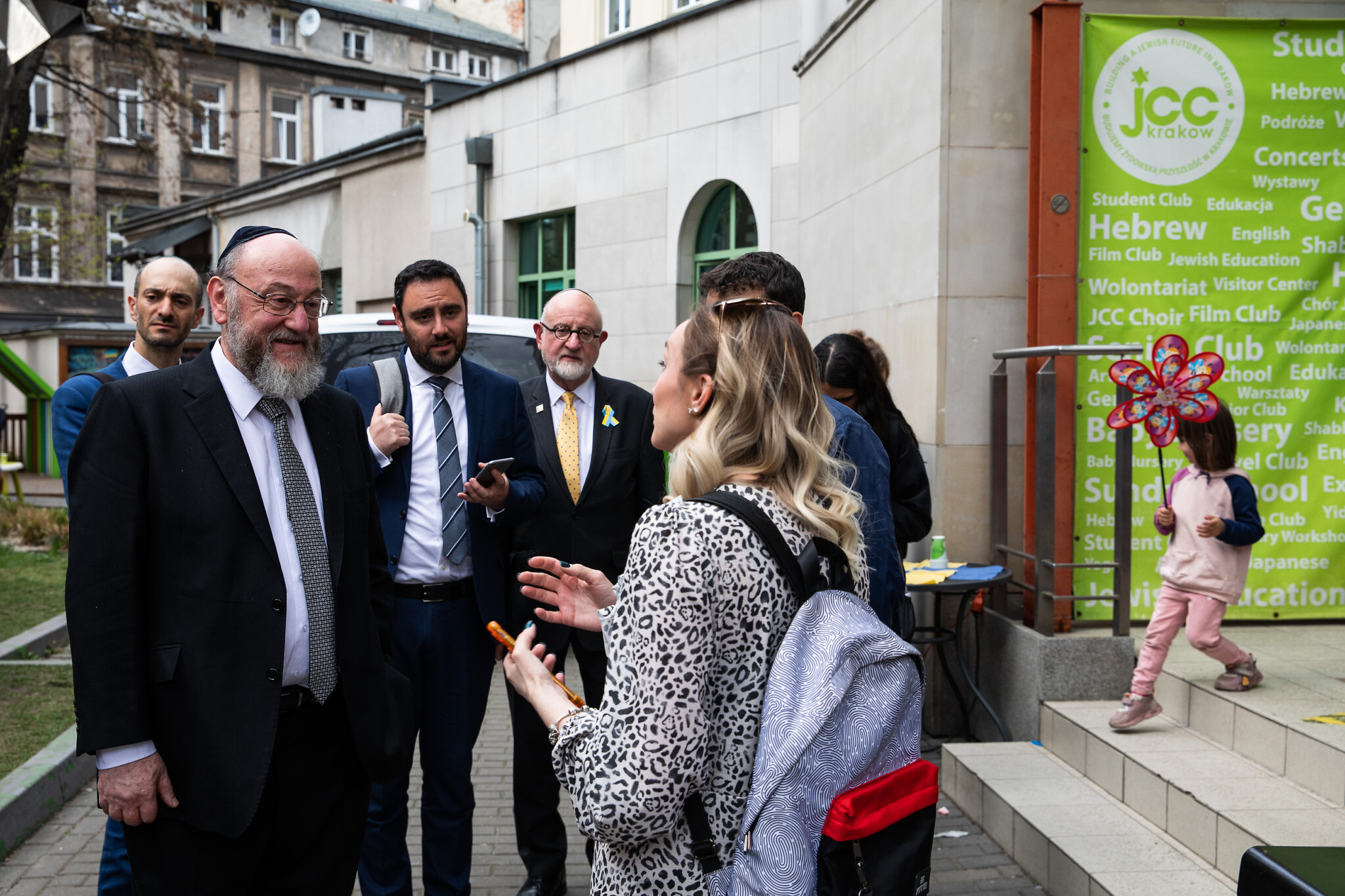
Anna is now one of hundreds who have gratefully accepted accommodation, food, clothes and other care, and also a result of the generous donations made by UK Jews to World Jewish Relief’s Ukraine appeal.
Today, despite her own uncertain life situation — her husband away fighting and parents still stranded in Kyiv as a result of her father’s disability — Anna was determined to say “thank you” to Rabbi Mirvis.
“I am not Jewish, but I feel safe here,” she told him.
Responding, Chief Rabbi said: “Anna, you do not have to thank anybody. You are an inspiration. May God bless you, and all of your family.”
But there is more to Anna’s story.
“I am questioning now, whether maybe it is destiny that because my family gave help to a Jewish family that now we are being helped like we are,” said Anna
On telephoning her parents to confirm how well she was being looked after by an operation that was both Jewish and committed to helping those who were not of the faith, her mother told her a piece of family history.
Anna had just told her mother she wished her family, like many Ukrainians, had done more to protect Jews, who protected her now, when the horrors of the Second World War unfolded.
But Anna’s mother revealed her great-grandparents had indeed stepped up, sheltering a Jewish family in the basement of their house for two years, ensuring they avoided the Nazi invaders and near certain death in the Holocaust.
“I am questioning now, whether maybe it is destiny that because my family gave help to a Jewish family that now we are being helped like we are,” Anna said.
“I didn’t know about this story about my family, my mother just told me.
“They kept the Jewish family in the basement, gave them food.”
Anna says that “right now” she is convinced “when you do something good to people, it comes back to you.”
She added: “I tell my family now that Jewish people are helping me. And I think of the story from the past, I believe in this.”
We had travelled to Krakow as part of a UK delegation, alongside Rabbi Mirvis and with WJR President Henry Grunwald QC to observe the work of the JCC, and to hear first-hand accounts from refugees being helped by Jewish service providers.
An earlier trip was planned for last month, including a visit to the border with Ukraine but the Chief Rabbi contracted Covid forcing a cancellation.
The rearranged trip now took place minus the border visit because the situation has become less chaotic there now.
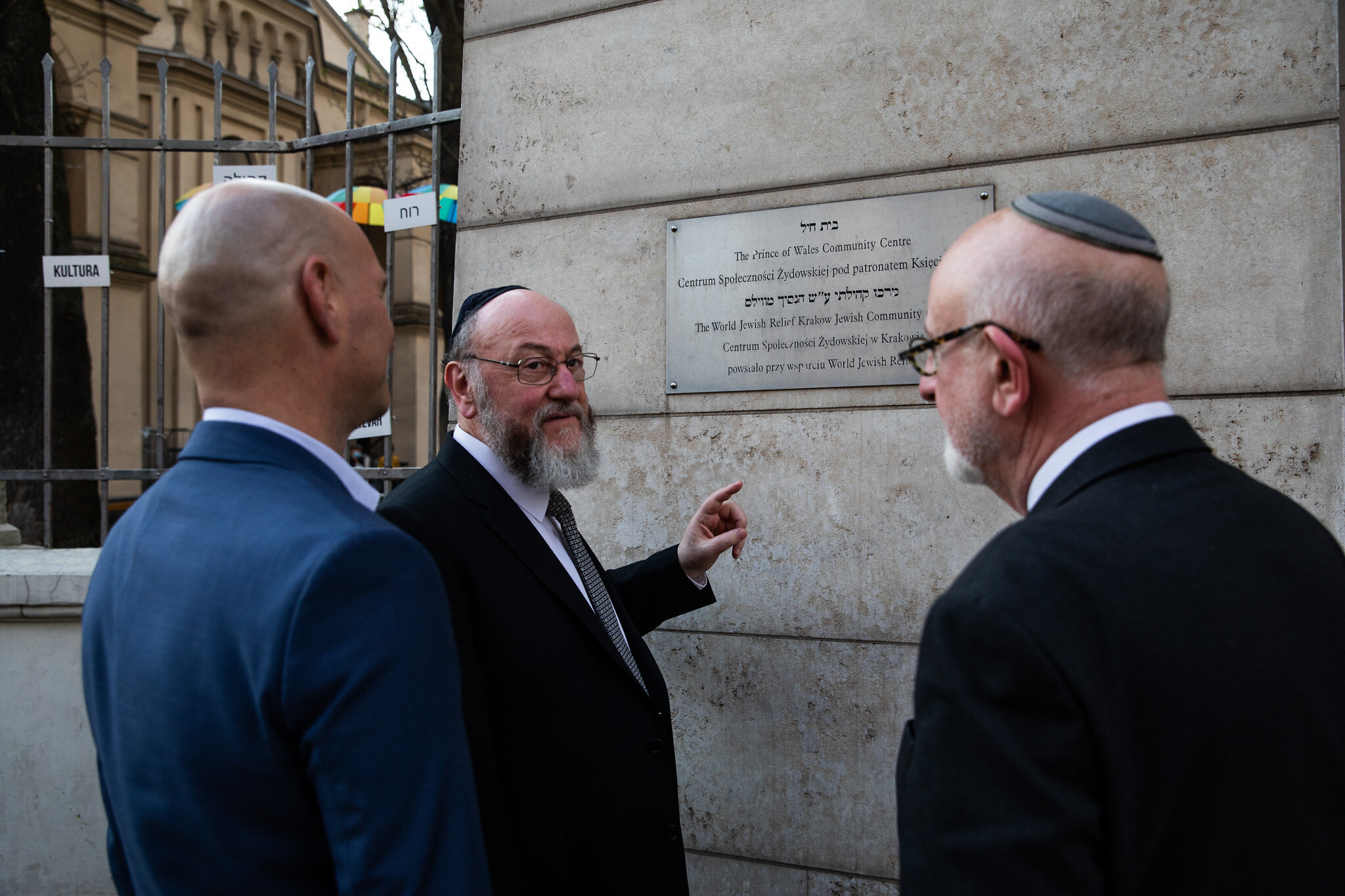
To arrive in the Polish city, modern on its outskirts, but more traditional and authentically beautiful in its centre, it was impossible as a Jew not to forget just 70 kilometres away is Auschwitz, the largest Nazi concentration camp where over 1.1 million lives were ended.
But, since April 2008, when Prince Charles came to the city to open the JCC Krakow building, the operation has been at the heart of a drive to revive Jewish life here.
The Prince’s association with WJR, who founded and actively supports the JCC Krakow venture, blossomed after he met Jewish communal figures in the city on an earlier visit in 2002.
It is impossible, as a Jew, not to forget just 70 kilometres away is Auschwitz
He subsequently became a patron of the WJR, who have been working in Ukraine for over 30 years.
The Ukraine appeal is of course currently WJR’s most high-profile campaign.
But the charity is still active helping people suffering from the impact of wars and poverty across the globe.
In places like Bangladesh, supporting the oppressed Rohingya Muslims, in Ethiopia, Syria, and amongst refugees escaping the Taliban regime in Afghanistan.
Only last Thursday, Prince Charles visited the WJR offices in northwest London, expressing a particular interest in hearing about the JCC’s efforts in helping Ukrainian refugees.
At one stage he took part in a Zoom conversation with a WJR operative stationed deep in Ukraine who was helping with the humanitarian relief operation.
The charity’s long-established links with Ukraine mean that even in the midst of the Russian bombardment they are able to work across 61 towns and cities there.
WJR support has reached over 100, 000 people with 3.4 tonnes of critical medicines arriving and over 75,000 packages of food and hygiene products.
“We shall be writing a report to Prince Charles on our findings immediately after our return,” confirmed WJR President Grunwald. “He really does share an interest. We are lucky to have him as a patron.”
If, up until the start of this year, JCC Krakow’s primary concern had been the restoration of Jewish life in Krakow, everything changed when Russia invaded Ukraine on February 24th, executive director Jonathan Ornstein said.
Speaking to the delegation from comfort of the headquarters Ornstein said the non-profit organisation has probably now outgrown, he explained the thinking behind the change of direction.
JCC Krakow is currently housing and feeding around 360 refugees in hotel rooms and apartments across the city.
Since February 24, JCC Krakow has directly helped over 40,000 Ukrainians escaping Putin’s brutal war.
Operating seven days a week, the main headquarters is now a distribution point for food, medicine, toys and clothing for over 600 refugees turning up every day.
More than 250 free meals are cooked, while truckloads of supplies are sent to other refugee centres in the city. JCC Krakow is currently housing and feeding around 360 refugees in hotel rooms and apartments across the city.
The organisation has worked on the border, helping over 10,000 Ukrainians escape the war in this way.
At the same time, the commitment to amplifying Jewish life has been maintained. Shabbat and Seder night services continue to take place, with around 50 Jewish Ukrainian refugees now at the centre.
Crucially, while organisations such as the Jewish Agency operate on the border to specifically help Jews escaping the war, often taking them to Warsaw, helping them plan new lives in Israel, the JCC way is to treat non-Jews and Jews the same way.
“The world needs empathy,” reasoned Ornstein, as he addresses the delegation. “In the past, there hasn’t been so much empathy for us.
“I think what’s really beautiful to me is that the Jewish response to others that now have this tragic situation is not to say, ‘Oh nobody cared about us, so we don’t owe it to others.’
The JCC way is to treat non-Jews and Jews the same way.
“It’s the opposite. It’s to learn from mistakes from others who didn’t do enough for us.
“That means we have even more responsibility to do for others.”
Rabbi Mirvis was quick to praise Ornstein for his profound observation.
He described the JCC’s work as “outstanding” and says it almost sad to have to emphasise that “as Jew and non-Jew we are all equal.”
It is also apparent that this a costly operation for the JCC, based around what is needed requiring to offer the refugees a comfortable escape from the hell of Putin’s war, rather than on long-term projections on what the organisation can afford.
Ornstein revealed $5,000 (£3,960) is spent each day just on food supplies. We do not hear how much it is costing to give the refugees accommodation in hotels and hostels in the city.
He admitted: “We don’t see ourselves continuing to operate at this level six months down the road.
“Housing 300-400 people six months down line, I don’t think it is sustainable.
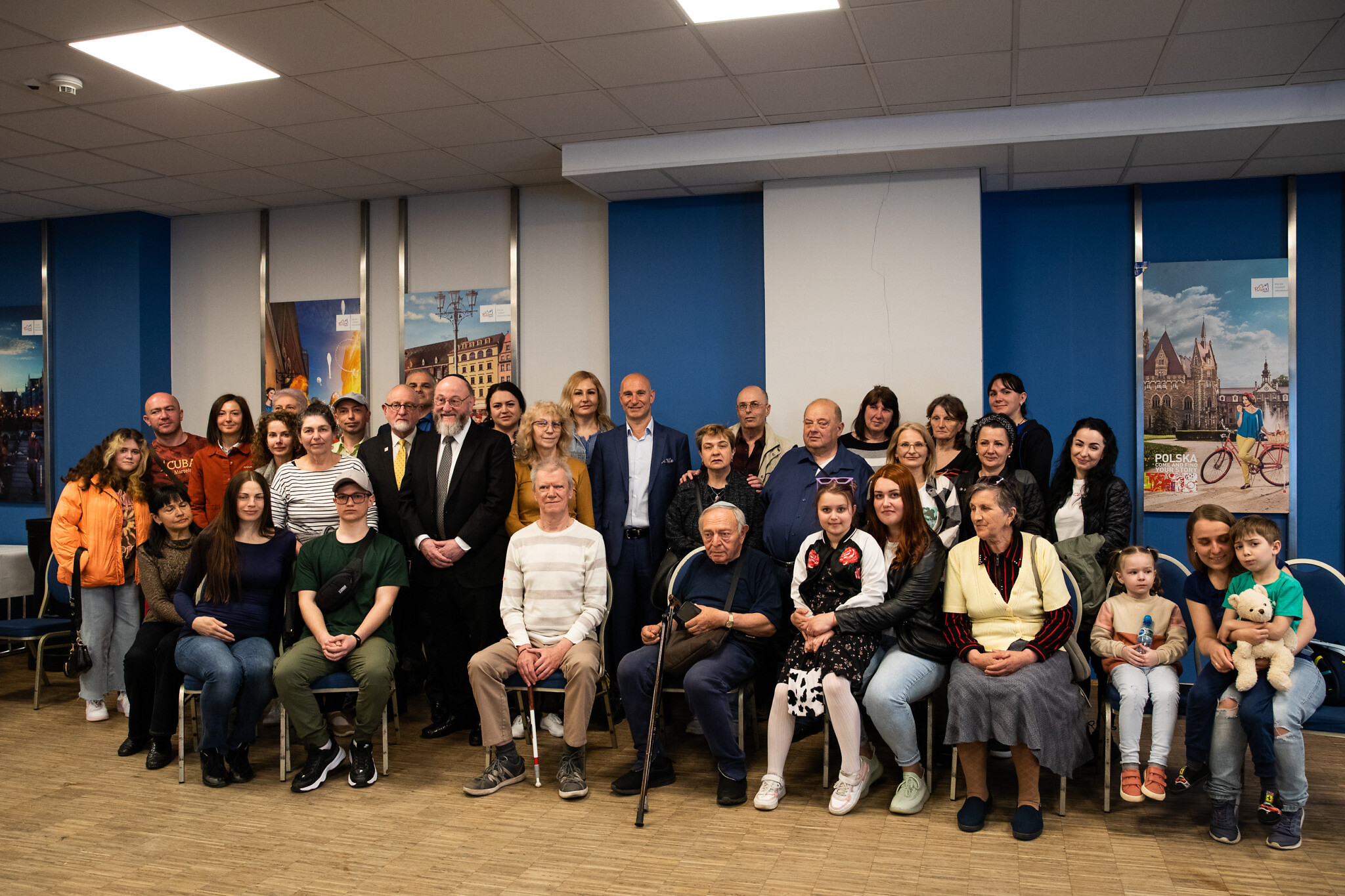
“But if we stop housing them, these women and children are going to be on the floor of the train station sleeping rough.”
Outside the JCC building, we speak to some of the refugees queuing for food and everyday supplies.
The Chief Rabbi is keen to hear the harrowing accounts, and to express heartfelt empathy to those he meets in the street.
Most of those we engage with as they queue for food and emergency supplies seem to recognise how aid given by Jewish people around the globe, including the UK, has ensured they are being looked after in desperate circumstances.
If we stop housing them, these women and children are going to be on the floor of the train station sleeping rough.
Krystina Derkach, a doctor, fled Kyiv with her five year-old daughter.
Her husband has remained in Ukraine to fight.
“It’s important not to be under Russian boots, to be a sovereign nation,” she said.
Fighting back the tears as she spoke, Krystina revealed that some of the relatives she has left behind are dead.
Now being looked after by the JCC, she then tells Rabbi Mirvis “it is really amazing what you are doing. What the Jewish people are doing for us.”
She added: “What people are doing from other countries is amazing. A lot of people, we just leave without anything. My mother, she came here to, with just two dogs.”
Later that evening, Rabbi Mirvis told Jewish News: “It was exceptionally heart-warming speaking to the people in the queue outside the JCC, where they definitely recognised this is a Jewish centre.
“They were filled for admiration for what Jewish people around the world are doing for them.”
We are then taken to a hotel 20 minutes away, where a group of around 30 refugees, whose accommodation is being paid for by the JCC are there to tell us their stories as we sit inside a large ballroom.
We hear a truly astonishing account of how one woman, pregnant with two children, had been forced to escape from a temporary home in Ukraine, with gunfire all around her in a garden.
At one point Ukranian forces, recognising that she would have almost certainly been killed if she remained in the property, appear to have made her step out in front while they fired at nearby Russian forces.
“The windows were all broken, we were like a live wall for Ukrainian soldiers. They shoot from our garden and let us (stand) in front of our forces,” she said.
“I feel like I am in a dream here,” she added, of her new temporary home in the hotel. “The support is so huge, and unsuspected. I had been crying, I didn’t want to leave Ukraine. I had perfect place to live and to bring up my children”
Asked by the Chief Rabbi where her husband is now, she replied that he is fighting in the territorial army.
“He told me at first just go to Poland for a couple of weeks, you will be safe there,” she added.
Later we met Yakov, aged 86, and his wife — a Jewish couple who have been driven to Poland from their home in the Ukrainian city of Vasylkiv.
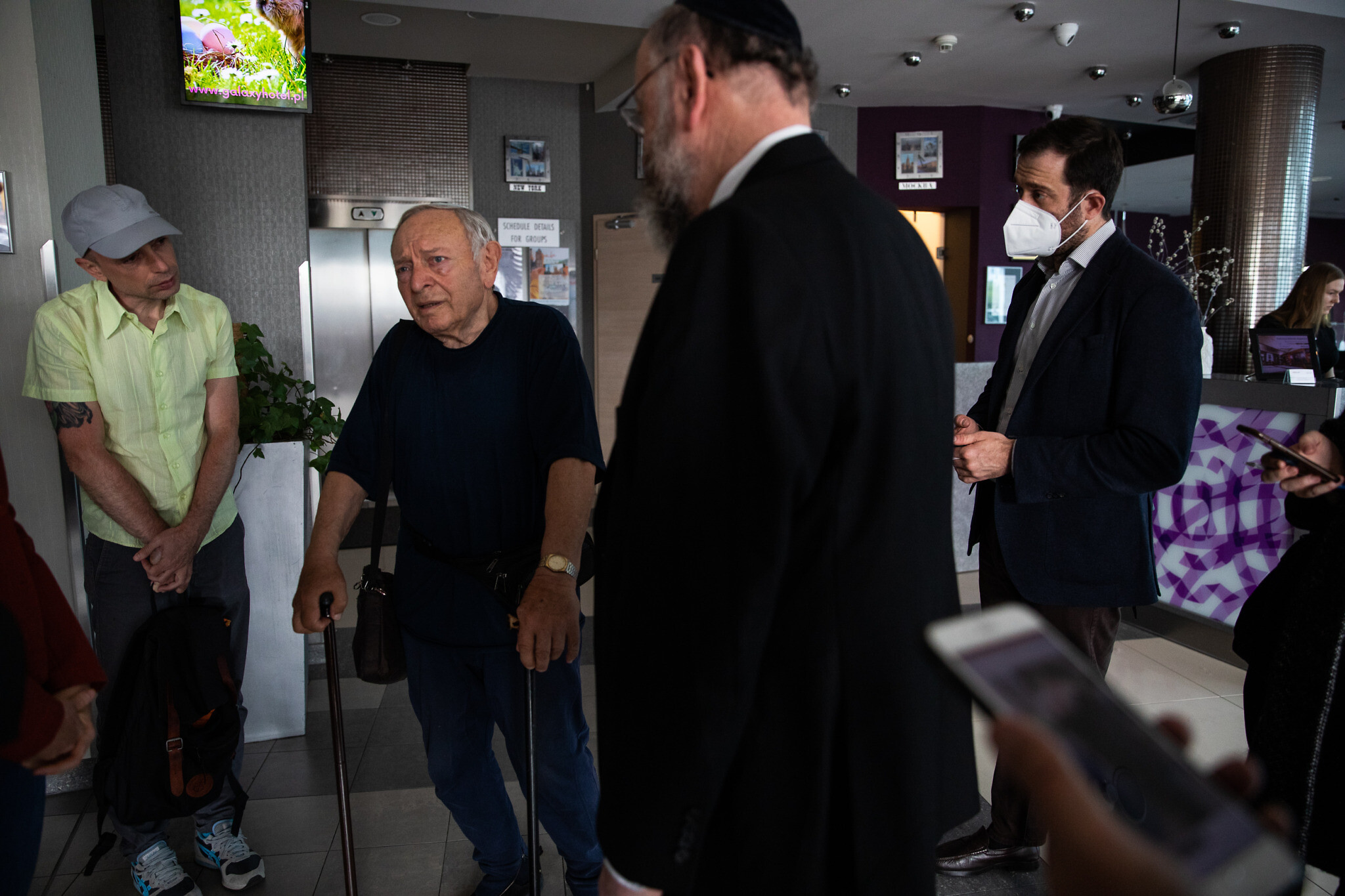
On arrival, one of the first thing Yakov asked for was a kippah, which he is wearing, and tallit to pray.
In an emotional exchange, Yakov, who speaks Yiddish, told of his family’s history prior to Putin’s invasion, attempting to maintain a Jewish existence in the city located on the Stuhna River in Kyiv Oblast in central Ukraine.
Rabbi Mirvis recalled a visit he made himself to the region several years ago, where he visited a synagogue in the city.
Another hostel has been taken over by the JCC in partnership with humanitarian outfit Salam Lab to provide a home for a group of around 130 Roma Ukrainian refugees who have fled the war.
To witness the Chief Rabbi engage in conversation, with the aid of an interpreter, with a group of around 25 Roma women gathered in a breakfast room, was a truly wonderful site.
Rabbi Mirvis describes the Roma women as “inspirational” and commends their pride in their identity, and also their ability to speak in one voice as they answer questions, including a clarification that is incorrect to view all Roma people as being the same.
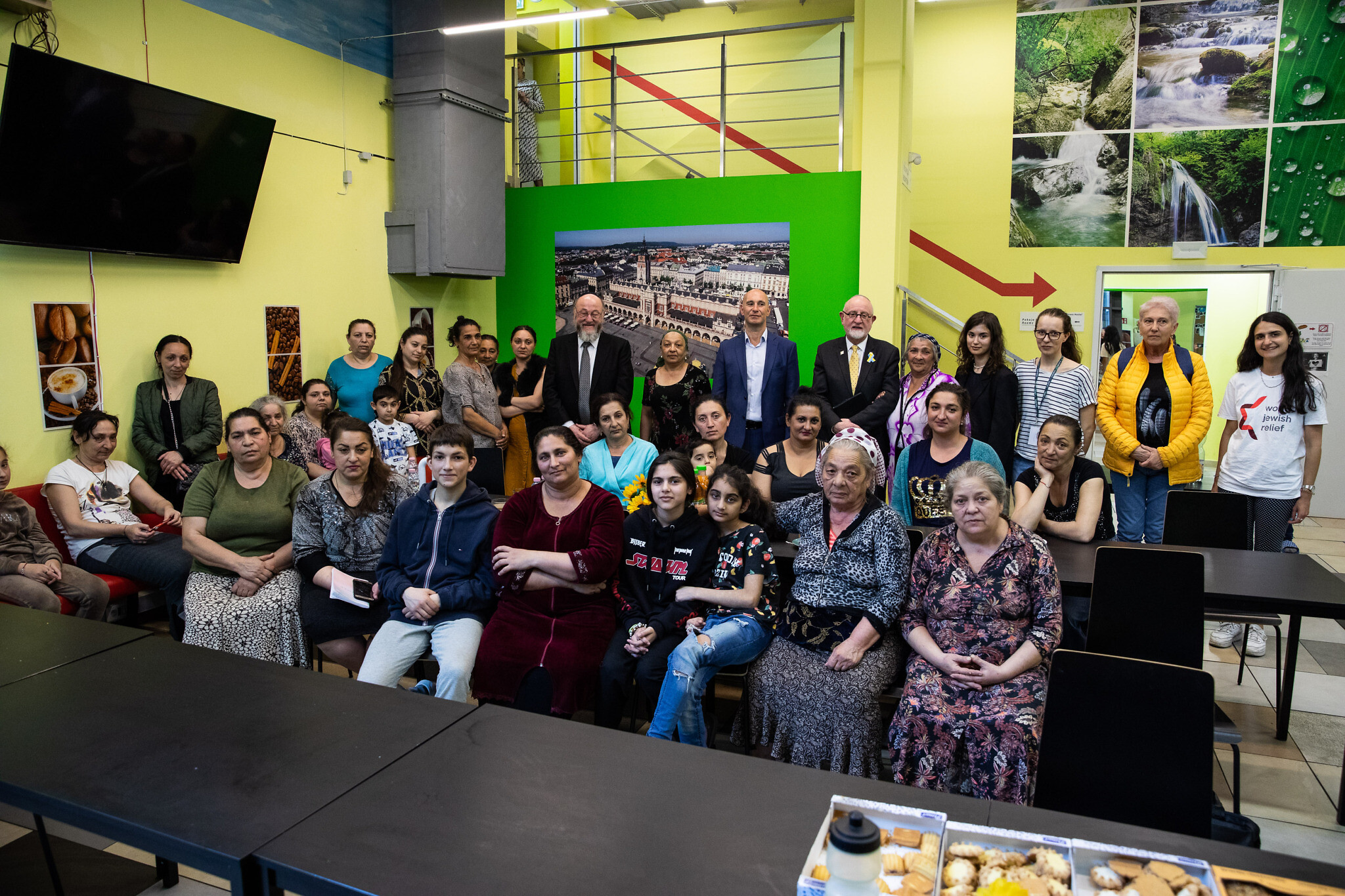
Outside the hostel, in conversation amongst the UK delegation, we cannot ignore the shared experience of the Jewish and Roma people in the Nazi death camps.
Ornstein said the Roma story is “tragic on so many levels,” and he explains many of them had remained in Ukraine for longer than most, even as the Russian bombs dropped.
It emerged that discrimination against the Roma has continued. Even as they fled Ukraine some refugees are refusing to live with them.
Before leaving Krakow we were joined at dinner in another poignant moment by Svetlana, a Ukrainian Holocaust survivor and now a refugee living in the Polish city, who is in her 80s.
For someone who experienced so much trauma in her life, it is uplifting to hear her speak in a defiant and upbeat way.
The UK delegation’s visit to Krakow may only have been packed into a single day, but it was long enough to recognise how in the midst of humanitarian tragedy like Ukraine, so much vital work is being done by organisations like WJR and JCC.
It emerges that discrimination against the Roma has continued, even as they fled Ukraine some refugees are refusing to live with them.
Work that is only made possible by the generosity of the global Jewish community through their donations.
What also shone through, like the brightest of lights, was the crucial role our Chief Rabbi Mirvis is also playing in this drive to help Jews and non-Jews alike as the war in Ukraine continues to take its toll.
“Today has been about Jewish people around the world being part of an organised effort to assist those who are facing a humanitarian crisis as a result of what is happening in Ukraine,” he later told Jewish News.
“I am filled with enormous pride at what our Jewish community is doing. All of British society has given admirably, but in particular the British Jewish community has given millions.
“This has been carried on through World Jewish Relief, and in other ways as well.
“And today we have seen just a small amount of what our efforts are doing for those who are going through a horrific plight.”
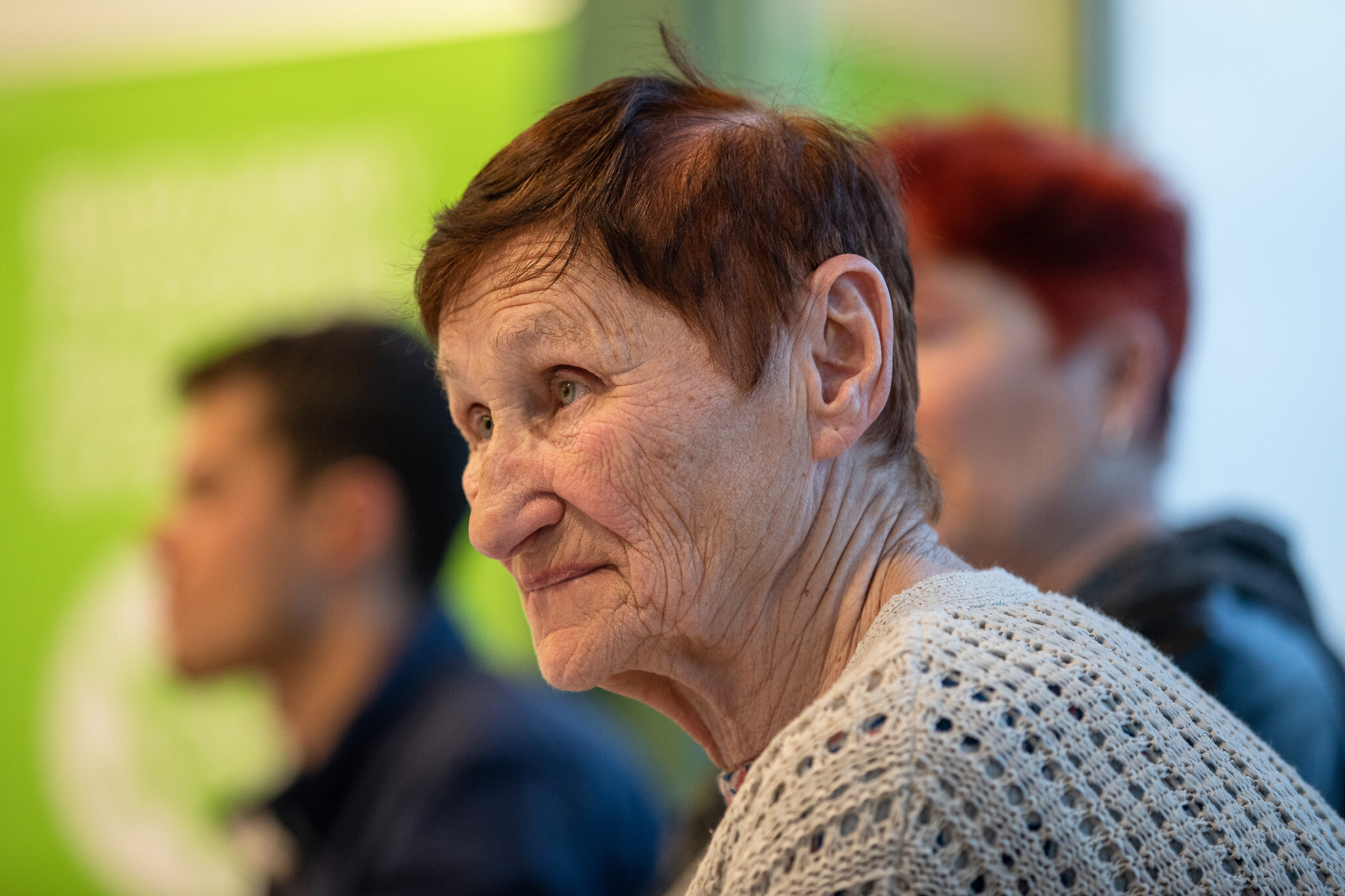
As we had listened to the harrowing accounts from the Ukrainian refugees, it was apparent that many sought to draw comparisons between their own plight, and the Nazi Holocaust of six million Jews.
Rabbi Mirvis: “I am filled with enormous pride at what our Jewish community is doing. All of British society has given admirably, but in particular the British Jewish community has given millions.
Rabbi Mirvis admitted, when asked, that he felt uncomfortable by the references to the Shoah by some of the refugees.
“The Holocaust is unique, simply incomparable,” he reasoned, while he also understood “where they [the Ukrainian refugees] are coming from.”
Mirvis continued: “The people today are going through deep emotion. They are going through a very deep trauma, and I won’t be quick to judge them.”
He stressed instead his continued commitment to the ideal of “global social responsibly” first set in his debut sermon as Chief Rabbi back in 2013.
“This is what I am prioritising, support for World Jewish Relief was natural. I am proud of the connection my office has with this organisation.”
And how much of an inspiration was it to Rabbi Mirvis to see Jewish people defined not by the concern about rising antisemitism, but by their willingness to step up to the mark and help those suffering in Ukraine?
“It is marvellous,” he replies. “That is what we are striving to achieve.
“That is the hallmark of our Torah, the essence of our faith. To reach out to all people created in the image of God.”

Thank you for helping to make Jewish News the leading source of news and opinion for the UK Jewish community. Today we're asking for your invaluable help to continue putting our community first in everything we do.
For as little as £5 a month you can help sustain the vital work we do in celebrating and standing up for Jewish life in Britain.
Jewish News holds our community together and keeps us connected. Like a synagogue, it’s where people turn to feel part of something bigger. It also proudly shows the rest of Britain the vibrancy and rich culture of modern Jewish life.
You can make a quick and easy one-off or monthly contribution of £5, £10, £20 or any other sum you’re comfortable with.
100% of your donation will help us continue celebrating our community, in all its dynamic diversity...
Engaging
Being a community platform means so much more than producing a newspaper and website. One of our proudest roles is media partnering with our invaluable charities to amplify the outstanding work they do to help us all.
Celebrating
There’s no shortage of oys in the world but Jewish News takes every opportunity to celebrate the joys too, through projects like Night of Heroes, 40 Under 40 and other compelling countdowns that make the community kvell with pride.
Pioneering
In the first collaboration between media outlets from different faiths, Jewish News worked with British Muslim TV and Church Times to produce a list of young activists leading the way on interfaith understanding.
Campaigning
Royal Mail issued a stamp honouring Holocaust hero Sir Nicholas Winton after a Jewish News campaign attracted more than 100,000 backers. Jewish Newsalso produces special editions of the paper highlighting pressing issues including mental health and Holocaust remembrance.
Easy access
In an age when news is readily accessible, Jewish News provides high-quality content free online and offline, removing any financial barriers to connecting people.
Voice of our community to wider society
The Jewish News team regularly appears on TV, radio and on the pages of the national press to comment on stories about the Jewish community. Easy access to the paper on the streets of London also means Jewish News provides an invaluable window into the community for the country at large.
We hope you agree all this is worth preserving.
-
By Brigit Grant
-
By Laurent Vaughan - Senior Associate (Bishop & Sewell Solicitors)
-
By Laurent Vaughan - Senior Associate (Bishop & Sewell Solicitors)
-
By Laurent Vaughan - Senior Associate (Bishop & Sewell Solicitors)
-
By Laurent Vaughan - Senior Associate (Bishop & Sewell Solicitors)





















